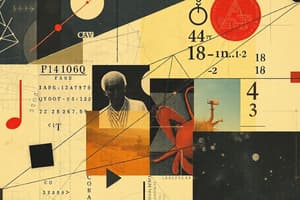Podcast
Questions and Answers
Which mathematical branch focuses on shapes and their properties?
Which mathematical branch focuses on shapes and their properties?
- Geometry (correct)
- Arithmetic
- Algebra
- Calculus
What is the primary operation included in basic arithmetic?
What is the primary operation included in basic arithmetic?
- Differentiation
- Factorization
- Division (correct)
- Integration
In calculus, what concept describes the instantaneous rate of change?
In calculus, what concept describes the instantaneous rate of change?
- Function
- Integral
- Derivative (correct)
- Limit
Which property of numbers states that changing the order of addition does not change the sum?
Which property of numbers states that changing the order of addition does not change the sum?
What type of statistics focuses on interpreting and making predictions about a population based on sample data?
What type of statistics focuses on interpreting and making predictions about a population based on sample data?
Which mathematical topic involves counting arrangements and combinations?
Which mathematical topic involves counting arrangements and combinations?
What does the Pythagorean theorem pertain to in mathematics?
What does the Pythagorean theorem pertain to in mathematics?
Which of the following is a key concept in algebra involving variables?
Which of the following is a key concept in algebra involving variables?
Flashcards
What is Mathematics?
What is Mathematics?
A formal system using logic and symbols to describe patterns, relationships, and quantities. It encompasses various branches like arithmetic, algebra, geometry, calculus, and more.
What is Arithmetic?
What is Arithmetic?
Deals with basic operations like addition, subtraction, multiplication, and division on numbers. It also includes properties of numbers like commutativity, associativity, and distributivity.
What is Algebra?
What is Algebra?
Extends arithmetic using variables to represent unknown quantities. It uses equations and inequalities to model and solve problems involving these unknown quantities.
What is Geometry?
What is Geometry?
Signup and view all the flashcards
What is Calculus?
What is Calculus?
Signup and view all the flashcards
What is Probability and Statistics?
What is Probability and Statistics?
Signup and view all the flashcards
What is Discrete Mathematics?
What is Discrete Mathematics?
Signup and view all the flashcards
What are Other Branches of Mathematics?
What are Other Branches of Mathematics?
Signup and view all the flashcards
Study Notes
Fundamental Concepts
- Mathematics is a formal system of logic, using symbols and rules to describe patterns, relationships, and quantities.
- It encompasses various branches, including arithmetic, algebra, geometry, calculus, and more.
- Core principles include axioms, postulates, and theorems developed through rigorous proof.
- Mathematical concepts are often visualized using diagrams, charts, and graphs to enhance understanding.
Arithmetic
- Deals with basic operations (addition, subtraction, multiplication, division) on numbers.
- Includes properties of numbers, such as commutativity, associativity, and distributivity.
- Covers significant number systems, including natural numbers, integers, rational numbers, irrational numbers, and real numbers.
- Introduces concepts of place value, rounding, estimation, and order of operations (PEMDAS/BODMAS).
Algebra
- Extends arithmetic by using variables to represent unknown quantities.
- Employs equations and inequalities to model and solve problems.
- Covers topics such as linear equations, quadratic equations, systems of equations, and inequalities.
- Introduces concepts of polynomials, factoring, and simplifying expressions.
Geometry
- Deals with shapes, sizes, and positions of objects in space.
- Includes various geometric shapes (triangles, quadrilaterals, circles, etc.) and their properties.
- Covers concepts like angles, lines, planes, and transformations.
- Introduces the Pythagorean theorem and other geometric formulas.
Calculus
- Deals with rates of change and accumulation of quantities.
- Includes differential calculus (derivatives) and integral calculus (integrals).
- Applies to functions and their graphs.
- Emphasizes concepts of limits, continuity, derivatives, and integrals.
- Used in modeling physical phenomena.
Probability and Statistics
- Deals with the likelihood of events occurring.
- Involves collecting, organizing, analyzing, and interpreting data.
- Introduces concepts of probability (e.g., permutations, combinations), different types of distributions (e.g., normal distribution).
- Focuses on descriptive and inferential statistics.
Discrete Mathematics
- Concentrates on countable objects and discrete structures.
- Includes topics like graph theory, combinatorics, logic, and set theory.
- Used in computer science and other fields.
Other Branches
- Further branches include number theory, topology, linear algebra, and others.
- These often build upon the fundamentals of arithmetic, algebra, geometry, and calculus.
- Often require specialized knowledge and techniques.
Problem Solving Strategies
- Identifying the key information.
- Formulating a plan to solve a problem.
- Testing the solution and revising as needed.
- Applying different strategies, like working backward, drawing diagrams, pattern recognition, and more.
- Checking for errors in calculations and solutions.
Studying That Suits You
Use AI to generate personalized quizzes and flashcards to suit your learning preferences.




